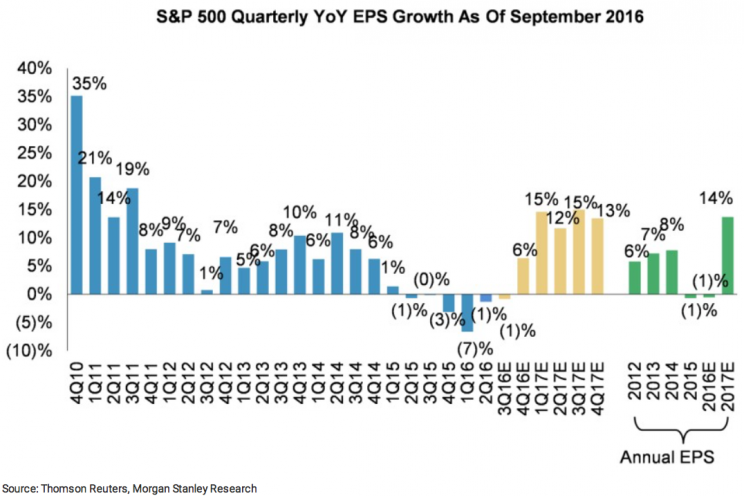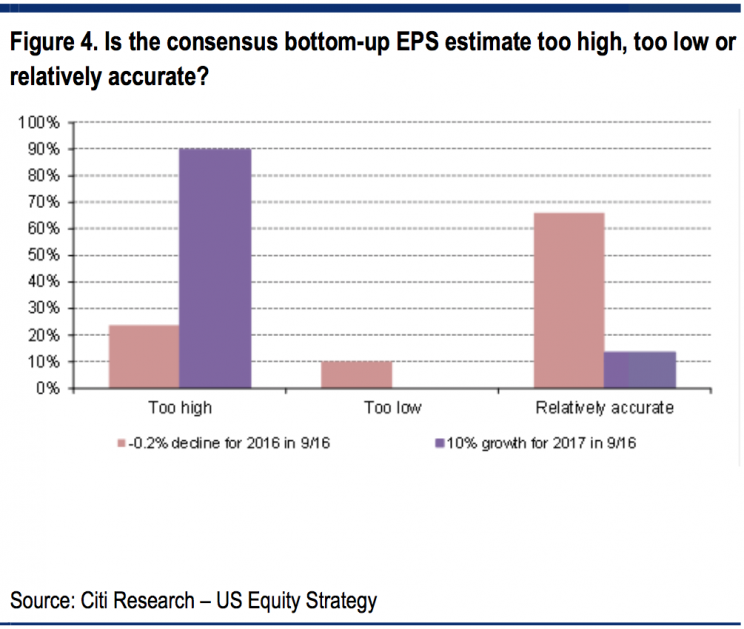A rebellion is forming among Wall Street's stock market forecasters

In the next few weeks, companies will reveal their third quarter financial results. Importantly, many companies will also offer their expectations for 2017.
This guidance for 2017 will be critical as S&P 500 (^GSPC) earnings have effectively seen no growth in 2015 and 2016. Meanwhile, the consensus among forecasters is that earnings will surge by 13-14% in 2017.
However, Wall Street’s forecasters are far from unanimous in their calls for 2017.
“We are in an odd position of thinking that this year’s numbers might be achievable but next year’s are likely way too high,” Morgan Stanley’s Adam Parker said on Monday. Parker expects 2017 earnings per share to grow by around 3.2% from his estimate of $123 in 2016.

Last month, UBS’s Julian Emanuel characterized the consensus forecast for 2017 as “irrationally exuberant.” He estimates S&P EPS will grow 5.9% next year.
This discussion is not news to Yahoo Finance readers. Months ago, forecasters began to raise serious doubts about these optimistic 2017 assumptions.
“Don’t believe the hype: 2017 earnings growth likely to be closer to 5% and not 14%,” JPMorgan’s Dubravko Lakos-Bujas said in a July note to clients. “For those placing faith in the grossly enthusiastic consensus EPS growth assumptions in the coming years, these hockey-stick projections will likely be revised down sharply.”
Citi recently surveyed clients about what they thought of 2017 forecasts, and about 90% of respondents agreed the numbers were too high.

The good news about all this is that more and more investors may already be prepared for bad news.
“The likelihood for estimate cuts as we head into 2017 already seem to be baked into money managers’ mindsets and therefore should not be market disruptive,” Citi’s Tobias Levkovich said on Friday. Levkovich expects S&P EPS to grow by around 6% in 2017.
Still, this does not necessarily mean bad news will be well-received. As such, as earnings season kicks off, guidance should be watched closely.
“Expectations for 2017 earnings growth are nearly double what we expect (+14% vs. +7%), and if companies continue to guide below consensus this quarter (the guidance ratio has been falling in recent months), downward revisions and poor performance could ensue,” Bank of America Merrill Lynch’s Savita Subramanian said. “Watch guidance this quarter as the corporate outlook could continue to weaken.”
The urgency of this discussion is heightened by the fact that market valuations are stretched. Currently, the forward 12-month P/E ratio, which is based on forecasts for earnings growth in the next 12 months, is high at around 16.6. This is far above the 5-year average over 14.8 and the 10-year average of 14.3. There are a couple of ways for valuations revert back to more modest levels including falling stock prices or surging earnings. Without the support of earnings growth, prices become that much more vulnerable to volatility.
To recap, Morgan Stanley, UBS, JP Morgan, Citi, and Bank of America Merrill Lynch all expect 2017 earnings growth to be about half of what the consensus is calling for.
–
Sam Ro is managing editor at Yahoo Finance.
Read more:
The next selloff could be triggered by something we’re not discussing right now
The stock market enters Q4 in a precarious position
UBS: Wall St.’s 2017 earnings forecast is ‘irrationally exuberant’

